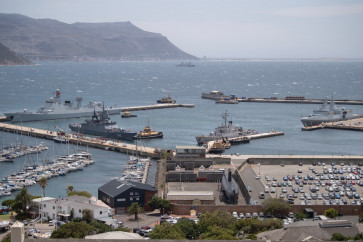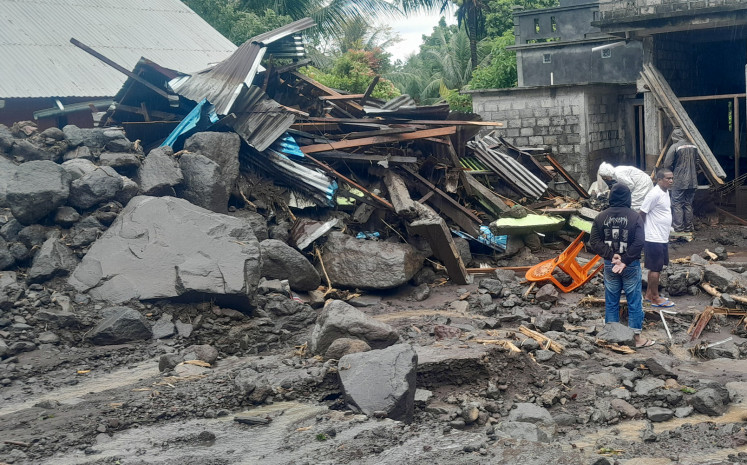Popular Reads
Top Results
Can't find what you're looking for?
View all search resultsPopular Reads
Top Results
Can't find what you're looking for?
View all search resultsNickel ore at center of new RI-EU trade row
Sparks fly: A worker smelts nickel at state-owned mining company Vale's smelting plant in Sorowako, South Sulawesi, on March 30
Change text size
Gift Premium Articles
to Anyone
S
parks fly: A worker smelts nickel at state-owned mining company Vale's smelting plant in Sorowako, South Sulawesi, on March 30. Indonesia's surprise plan to ban the export of nickel two years early may scare foreign investors away from Southeast Asia's biggest economy, analysts say, as it could cement a reputation for policy flip-flopping.(AFP/Bannu Mazandra)
As the quarrel over Indonesia’s palm oil business rumbles on, trade tensions between Indonesia and the European Union have flared again following the bloc’s complaint to the World Trade Organization over Indonesia’s nickel export ban and alleged illegal subsidies.
The European Commission sent on Nov. 22 a letter to the WTO challenging Indonesia’s nickel ore export ban, which comes into effect in January next year, saying Indonesia’s ban “goes against WTO rules”. The commission also openly stated that it wanted to protect European interests, particularly those of European steel producers, who risked losing a major supplier of raw nickel, which is a key ingredient in the production of stainless steel.
The Indonesian ambassador to the United Nations and the WTO in Geneva, Hasan Kleib, confirmed on Wednesday that the EU ambassador in Geneva had sent a notification letter to his office and extended a request for consultation.
“The consultation is a first step toward a dispute resolution at the WTO,” he wrote in a text message.
Indonesia, he went on to say, had to answer the letter in 10 days to state whether or not it wanted to hold the consultation. If Indonesia wishes to discuss the matter, the consultation should be held in 30 days. If not, the EU has the right to ask the WTO to open a dispute panel.
Hasan said that while waiting for further instruction from the government, Indonesia's representative in Geneva would accept the EU's invitation for the consultation in an agreed time, place and format.
The Energy and Mineral Resources Ministry introduced the nickel export ban to push local nickel miners to refine the raw ore domestically and export higher-value commodities. Stainless steel and car batteries are the two most lucrative uses of nickel.
According to data from Singapore-based lender UOB, there are expected to be 31 nickel smelters operational in Indonesia by 2021. Once operational, the smelters will have a combined input capacity of 71.2 million tons, more than twice the country’s capacity of 32.7 million tons as of last year.
However, as the world’s largest nickel producer, having mined a quarter of the global nickel supply last year, Indonesia’s announcement has shocked foreign manufacturers including those in China, Europe and Japan.
“The restrictions unfairly limit access by EU producers to raw materials for steel production, notably nickel, as well as scrap, coal and coke, iron ore and chromium,” the European Commission said in its statement.
“The EU is also challenging subsidies that encourage the use of local content by Indonesian producers and give preference to domestic over imported goods, which goes against WTO rules,” it continued, referring to an import duty exemption scheme that makes benefits for the import of machinery, goods and other material for production processes in newly established or modernizing factories, conditional upon the use of at least 30 percent of locally made components.
The EU also claims that Indonesia’s manufacturing methods produce up to seven times more carbon dioxide emissions than the processes used in Europe.
The Trade Ministry’s international trade negotiations director general, Iman Pambagyo, dismissed the concerns in the complaint, saying the government and its counterpart were arranging a schedule for a bilateral meeting.
“I think this case is unremarkable because these are the rules of WTO membership. We will of course defend our interests,” he wrote in a text message to The Jakarta Post on Wednesday.
An official from the energy ministry expressed a similar view.
“[The complaint] is old. It’s normal. We will explain that we want to process the ore by ourselves, that very soon we will have fairly sizable smelters so that we need to conserve nickel ore [for domestic processing],” said the ministry’s coal and minerals director general, Bambang Gatot Ariyono.
Bambang referred to the fact that Japan had threatened to issue a similar complaint to the WTO in 2012, two years before Indonesia enforced its first nickel ore export ban in 2014. Japan never did submit the complaint and Indonesia lifted the ban in 2017.
"We rely on the WTO agreement, which both Indonesia and the EU are part of,” EU Ambassador to Indonesia Vincent Piket told the Post in an interview in Jakarta on Wednesday.
“The WTO does not permit the type of ban of exports of raw materials by countries because it unfairly favors the domestic industry and it unfairly discriminates against the industry of your trade partner," he added.
He denied that the challenge was a response to Indonesia's continued threats to take the palm oil issue to the WTO.
Indonesian palm oil faces growing restrictions overseas, particularly in Europe, which decided in March to completely phase out the use of palm oil-based biofuel by 2030. The EU regards palm oil as a high-risk vegetable oil as a result of deforestation.
Indonesian officials have said the government plans to file its case against the EU and its renewable energy policy with the WTO sometime in November.










